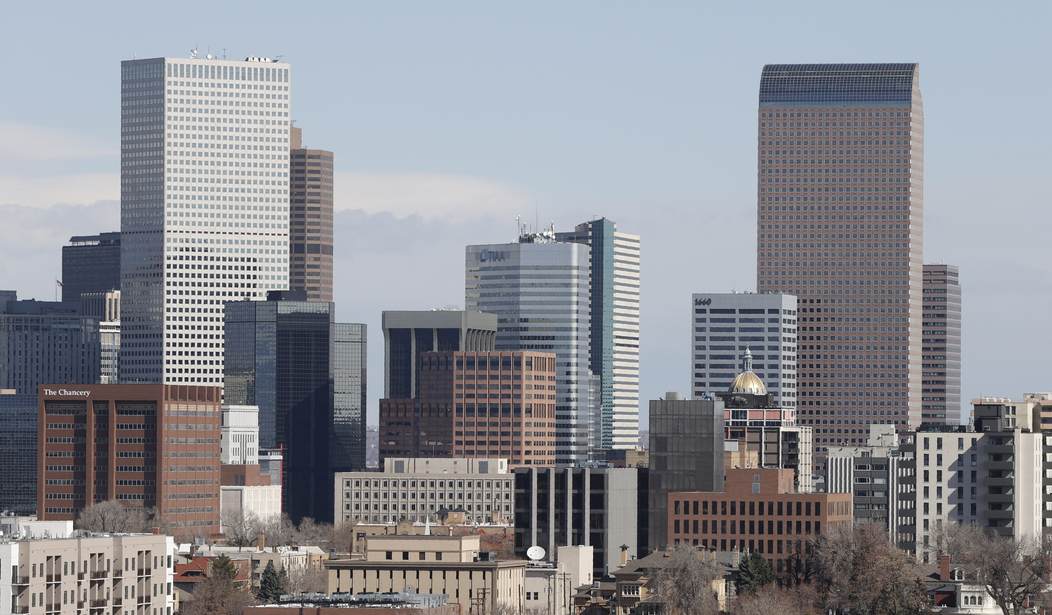I'm still an odd one to be writing about the state of America's urban areas. As you all know, if you've been reading my work, I grew up in a rural setting, I'm a happy rural dweller myself these days, and have little time for cities. I find them unpleasant; crowded, noisy, and, to be honest, they smell bad. I like the clean country air of the Susitna Valley, and if that means I have to put up with clearing away a three-foot snowfall so we can get in and out in the winter, well, in Alaska, that goes with the territory.
With that being true, why am I still worried about America's cities? Because our cities are the beating hearts of our nation. Much of the country's economic activity happens there. Urban areas contain a lot of the country's industry and academia. What's more, our cities used to be the pride of the nation, but that's not so much the case anymore. Rampant open-air drug use, huge homeless encampments, and rampant crime are taking their toll.
Case in point: Denver. Now this city's plight hits me rather hard. We lived for 30 years in a suburb of Denver, Aurora, now best known for the Tren de Aragua gangsters taking over apartment buildings. We raised our family in Aurora. My in-laws and two of our four kids still live in the greater Denver metropolitan area. Because of that, it's a city we still visit often, and I'm saddened more with every visit to see the increased congestion, the traffic, and yes, the homeless enclaves that seem to be springing up all over.
Denver-area residents are becoming increasingly frustrated with these problems, and at least one group that is documenting Denver's homeless encampments has had its members doxed by a major local media outlet, the Denver Post. If this isn't an attempt to shut these activists up, I don't know what is.
On Aug. 1, The Denver Post exposed the names, locations, voter registrations, and employment of three private citizens who legally obtained public information and sent some to the popular social media account Do Better Denver. On Aug. 7, a Denver Post columnist defended the paper’s decision to dox the three women for sharing public information.
“People who claim to be citizen journalists must stand by their work with a byline and endure the negative comments and threats that come with the job,” wrote Denver Post columnist Krista Kafer.
With all due respect, which isn't much - horse squeeze. These people are entering into this activity out of frustration with their city and county governments, with the failure to accomplish anything substantive in dealing with the area's homeless problem and the crime and squalor that go with it. They aren't professionals, and this is a blatant, transparent attempt by a left-leaning legacy media outlet to shut them up.
The Post identified the three people it doxxed by doing a public records request for those women’s public records requests: “The Post filed open records requests to obtain copies of requests tied to DoBetterDNVR,” wrote The Post’s crime reporter Shelly Bradbury in her Aug. 1 article. On Aug. 5, the Denver Gazette confirmed the three doxxed women are not the account administrator. The public records they shared with the accountholder comprise less than 1 percent of Do Better Denver posts.
Bradbury also wrote that the Post targeted the women specifically for exercising their legal rights to view public information. The three, Bradbury wrote, “stand out because of their involvement in the account since its early days in 2023, their connections to each other, and because they did not just send a single video or photo to the account but pursued information through open records requests.”
You can see DoBetterDNVR's X account here. A couple of samples:
13th & Harlan. Hey @LakewoodPDCO check out this camp along the bike path in @LakewoodCOgov - Why are you allowing this in our public spaces? @govofco pic.twitter.com/fIe88PCDhx
— Do Better Denver (@dobetterdnvr) August 11, 2025
Harm “reduction” = slumped bodies all over Denver’s sidewalks and public spaces. https://t.co/VvpxRyyZ1v
— Do Better Denver (@dobetterdnvr) August 7, 2025
It's not just Denver. In nearby Colorado Springs, once known for being a staunch Republican jurisdiction, people in the homeless enclaves along Interstate 25 are actually tapping that highway's light poles for electricity, which seems an enormous fire risk, especially in an area known for a warm, dry climate.
On Tuesday, May 13, multiple law enforcement agencies cleared out a homeless encampment beneath Intestate 25 near Woodmen Road, where televisions, lighting and stereo equipment were found to be powered by illegally tapping into I-25’s light poles.
According to a press release sent by the El Paso County Sheriff’s Office, its agency teamed up with the Colorado Springs Police Department and the Colorado Department of Transportation to help initiate a restoration project beneath I-25 just north of the Woodmen Road exit.
Colorado Springs and El Paso County seem able to deal, at least, with this problem. What's up with Denver?
Read More: The Downfall of America's Cities: Oakland, the Shame of the West Coast
The Downfall of America's Cities: The Nation's Capital City, a Crime-Ridden Pesthole
Another Denver suburb, Lakewood, is also dealing with the expanding homeless enclaves.
Cities surrounding Denver have seen an influx of homeless over the last few years despite fewer services available for them in the suburbs. Some officials faulted the homeless migration to issues within Denver, while others said it's a growing problem across the board. In any case, Lakewood residents said they are increasingly becoming anxious with the seemingly high numbers of homeless in their city.
"We don't know who's down there. If we have a sexual predator move into our neighborhood, we're supposed to be notified of it. Because they have no address, we don't know who they are. We don't know what they've done," said Bob Meulengracht, a lifelong Lakewood resident. "It's this anxiety that is caused when you see somebody pushing a shopping cart through your neighborhood."
Denver offers no estimates, of course, on what this problem is costing taxpayers.
Denver and the surrounding area seem to be morphing into Los Angeles on the Front Range, and not in a good way. (Not that there is a good way to morph into Los Angeles.) The city and county governments seem unable to do anything about the homeless problem and the crime, drug use, filth, and the threats to public health and safety that go along with them. And again, we see local governments that have failed to protect the liberty and property of the people; we see a major American city plagued with a major crisis, and in this case, worst of all, you see a local legacy media outlet that is trying to shut up people who are exposing and documenting the mess.
I'm saddened by all this, this city in particular. I have ties to Colorado and the Denver area. We have family and friends there. Colorado is one of the nation's most beautiful states. But decades of liberal governance have sent Denver into a tailspin. Colorado has shifted to a blue state. When I moved there in 1989, Colorado was in many ways like a South Wyoming. Now it's East California. And in DoBetterDNVR's reporting, you see the results of that transformation.














